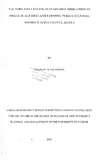| dc.description.abstract | Purpose of this study was to investigate the factors influencing sustainable irrigation of small scale dryland farming in Kitui Central District, Kitui County, Kenya. The study was guided by the following objectives to: establish how land tenure; identify the extent to which national irrigation policy; establish how irrigation technology; determine the extent to which competitive alternative water uses; and identify how farmer's level of education and training had influenced sustainable irrigation of small scale dryland
farming.
A descriptive survey research design was adopted. The target population was all smallscale dryland irrigation farmers in the district. In each cluster, a proportional 10% of the population was sampled. The small-scale farmers were grouped into three clusters Kalundu and Nzeeu river banks and those using shallow wells. From each cluster a sample proportional to 10% of the population was selected using simple random sampling to give 76, 61 and 13 a total of 150 small-scale farmers and 10% was given as the minimum sample size representing the target population by (Mugenda and Mugenda, 2003). A questionnaire and an interview guide were used for data collection. The instrument was pretested by a means of a pilot study.
In the pilot study, the questionnaire was administered on a random sample of ten small scale irrigation agriculture farmers who did not participate in the actual study and reliability was determined using a split-half method. During data collection the questionnaire was personally administered to 103 farmers as well as face-to-face interview with 47 of the selected farmers who were not able to fill in the questionnaire independently. The filled in questionnaire was collected before leaving each of the selected farmer to visit the next farmer.
Data was analyzed using descriptive statistics that utilized the frequency distributions; percentages; averages or mean values for concentrations of responses. Study results were presented in frequency distribution tables preceded by the findings' explanations. The study findings were that land tenure, irrigation policy, irrigation technology, water legal rights with competitive alternative water uses and farmers' level of education and training had significantly influenced sustainable irrigation of small scale dryland farming in Kitui Central District. The study recommendations were that for any state that wishes to maximize the land use, the traditional discriminative land tenure should be controlled by the government as it waives the intense politicization of land tenure.
The irrigation policy and technology should be supportive to the development and growth of small scale dryland farming in its provision for incentives that promotes small scale dryland farming establishments, in market access, credit access, transport and the general provision of the required infrastructural facilities that could help in enhancing sustainable irrigation of small scale dryland farming in most of the arid and semi-arid lands.
On the availability of water for irrigation, water legal rights and competitive alternative water uses the government should provide a level equal opportunity access to sustainable water source and supply in order to support a sustainable irrigation of small scale dryland farming programme that would change most of the arid and semi-arid lands to green with adequate agricultural produce. | en_US |

